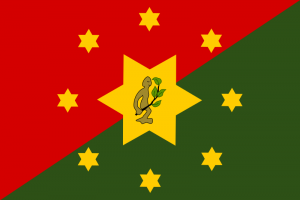Language/Agarabi/Grammar/Questions
Hi Agarabi learners! 😊
In this lesson, we will study how to form and use questions in Agarabi. Learning how to ask and answer questions is an essential part of communication. By the end of this lesson, you will be able to ask basic questions and understand the answers. Let's get started!
Don't miss the chance to check out these pages as you wrap up this lesson: Pronouns, Conditional Mood & Plurals.
Types of Questions[edit | edit source]
In Agarabi, there are two types of questions: yes/no questions and wh-questions.
Yes/No Questions[edit | edit source]
Yes/No questions are questions that we answer with either "yes" or "no". These questions are formed by changing the word order of a statement. For example:
| Statement | Yes/No Question | |
|---|---|---|
| מדרך מים | מדרך מיםן גריש? (Madirakh mayim | Madirakh mayim ganrish?) |
In the above example, the statement means "the path has water." But to turn it into a yes/no question, we simply move the verb "has" to the beginning of the sentence and add a question mark at the end. The resulting question means "does the path have water?"
Here is another example:
| Statement | Yes/No Question |
|---|---|
| הוא אוכל פיצה | הוא אוכל פיצה? (Hu ochel piza) |
In the above example, the statement means "he is eating pizza." But to turn it into a yes/no question, we simply add a question mark at the end. The resulting question means "Is he eating pizza?"
Wh-Questions[edit | edit source]
Wh-questions are questions that begin with words like "what," "where," "when," "who," "why," etc. These questions require more information than just a simple "yes" or "no" answer. Here is an example:
| Statement | Wh-Question | |
|---|---|---|
| אתה יודע לשחק טניס | מה אתה יודע לעשות? (Ata yodea le'sakay tenis | Ma ata yodea la'asot?) |
In the above example, the statement means "you know how to play tennis." But to turn it into a wh-question, we change the word "tennis" to "what" and add a question mark at the end. The resulting question means "What do you know how to do?"
Here is another example:
| Statement | Wh-Question | |
|---|---|---|
| המסעדה נמצאת ברחוב החדש | איפה המסעדה נמצאת? (Ha'mis'ada nimitsa be'khutz hahadash | Eifo ha'mis'ada nimitsa?) |
In the above example, the statement means "the restaurant is located on the new street." But to turn it into a wh-question, we change the word "street" to "where" and add a question mark at the end. The resulting question means "Where is the restaurant located?"
Question Words[edit | edit source]
Question words are words that we use to form wh-questions. Here are some common question words in Agarabi:
| Question Word | Pronunciation | English Translation |
|---|---|---|
| מה | Ma | What |
| מתי | Matai | When |
| למה | Lema? | Why |
| איפה | Eifo | Where |
| מי | Mi | Who |
| איזה | Eizeh | Which |
| כמה | Kamah | How much/many |
Using these question words, we can form wh-questions like the ones we saw in the previous section.
Forming Yes/No Questions[edit | edit source]
Yes/No questions are formed by changing the word order of a sentence. To make a yes/no question, we do the following:
1. Move the verb to the beginning of the sentence. 2. Add the subject after the verb. 3. Add a question mark at the end.
Let's look at an example:
Statement: האם הוא בא? (Ha'im hu ba?) Translation: Is he coming?
The literal translation of the statement is "is he coming?" However, to ask a yes/no question in Agarabi, we must begin the sentence with the verb, which in this case is "is". So, we move "is" to the beginning of the sentence, and we get:
Question: הוא בא? (Hu ba?) Translation: Is he coming?
Notice that the subject "he" comes after the verb in the question form.
Forming Wh-Questions[edit | edit source]
Wh-questions are formed by adding a question word to the beginning of a sentence. Let's look at an example:
Statement: הוא לומד שפה חדשה. (Hu lomed s'fa hadasha.) Translation: He is learning a new language.
To turn this statement into a wh-question, we add a question word to the beginning of the sentence. For example:
Question: מה הוא לומד? (Ma hu lomed?) Translation: What is he learning?
In this example, we added the question word "what" to the beginning of the sentence, and the rest of the sentence remained the same.
Practice[edit | edit source]
Here is a dialogue to help you practice making questions in Agarabi.
- Person 1: מה הווה הספר? (Ma hovah ha'sefer?)
- Person 2: הספר הוא מאכלוסיית רובינזון וקירבה. (Ha'sefer hu me'ukhalusi'at Robinson ve'kirva.)
- Person 1: איזה בית ספר הם לומדים בו? (Eizeh beit sefer hem lomdim bo?)
- Person 2: הם לומדים בבית הספר הפרטי של רובינזון. (Hem lomdim be'beit ha'sefer ha'prati shel Robinson.)
- Person 1: איפה מתקיים המסיבה? (Eifo mitkayem ha'mesiba?)
- Person 2: המסיבה מתקיימת בגן העיר. (Ha'mesiba mitkayemet ba'gan ha'ir.)
Tips[edit | edit source]
Asking questions is a great way to practice speaking with native Agarabi speakers. To find native speakers, you can use the Polyglot Club website. Find native speakers and ask them any questions!
For more Agarabi grammar lessons, you can visit the Grammar section of the Agarabi language page on the Polyglot Club website.

